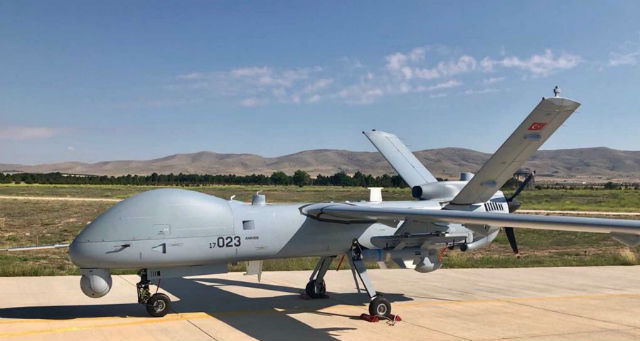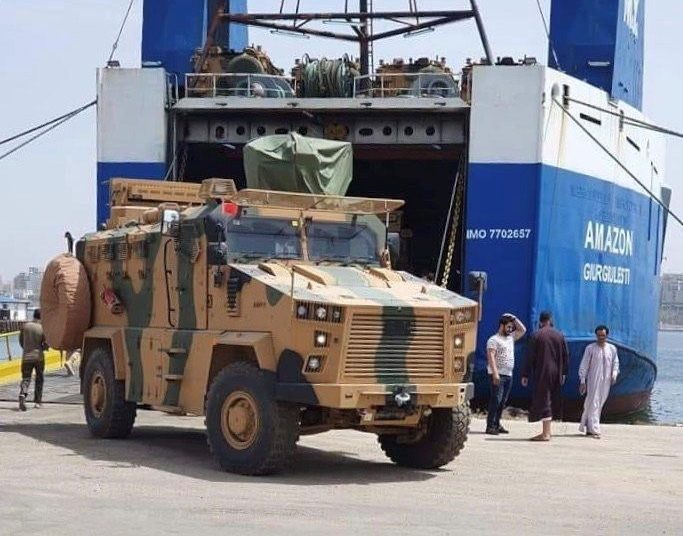Levent Kenez/Stockholm
Turkish President Recep Tayyip Erdoğan on Tuesday hosted Angolan President Joao Manuel Gonçalves Lourenço in Ankara in the first official visit in the history of the two countries. While commercial issues were expected to be at the top of the agenda, Turkey’s initiatives related to defense exports dominated the trip.
The Turkish Presidential Directorate of Communications announced a joint press conference following the meeting between Lourenço and Erdoğan with the title “Turkey will stand by Angola in the fight against terror” despite the fact that no serious terrorist act has taken place in Angola since 2010.
“Although from afar, we know and follow what kind of difficulties take place in Angola and Africa. As a country that has proven itself anytime anywhere in the fight against terrorism, Turkey will stand by Angola as well,” said Erdoğan.
One day later, it became clear what Erdoğan meant. Lourenço, the former defense minister of Angola, paid a visit to the Turkish Presidency of Defense Industries, accompanied by chairperson İsmail Demir and Technology Minister Mustafa Varank. Lourenço was introduced to the weapons produced by Turkey during a brief presentation. A video was also released after the visit that didn’t reveal which weapons were presented to the visiting president.
Interestingly, Erdoğan promised to visit Angola with a group of businessmen to address several issues on-site including the defense industry, right after the UN General Assembly in September. The two leaders will meet for the second time in only two months, an indication that concrete projects are being negotiated.
As a side note, the Islamist Erdoğan, who frequently claims he defends the rights of all Muslims all over the world, did not bring up the rights violations suffered by Muslims in Angola during the talks. According to the US Department of State’s 2020 Report on International Religious Freedom, the Angolan government continued not to recognize any Muslim groups or issue permission to Muslim groups to practice their religion legally. Requests for official recognition submitted in 2019 by two Muslim organizations are still pending. However Turkish Ambassador to Angola Alp Ay previously said it would be difficult to say that there is a serious problem with religious freedoms for Muslims in the country. Nordic Monitor previously reported that the Turkish Embassy in Luanda, the capital of Angola, engaged in a large-scale spying campaign against Turkish citizens who are critics of Erdoğan, publishing confidential court documents.
It is no secret that Turkey is looking for new markets in Africa for the defense industry, in which it has invested heavily in recent years. So far, Turkey has signed bilateral agreements with Tanzania, Sudan, Uganda, Benin and Côte d’Ivoire to cooperate in industrial production, procurement and maintenance of military and defense materiel as well as technical and logistical support, information sharing and research in the field, opening up new markets up to Erdoğan’s defense conglomerates.
It was revealed in April that Morocco had signed a contract with Turkey for the acquisition of 13 Bayraktar TB2 unmanned combat aerial vehicles (UCAV) for MAD 626 million ($69.6 million). The agreement reportedly stipulates that Turkey will build four remote control ground stations and provide a configurable simulation system as well as a digital system for tracking and storing information.

Tunisia reportedly signed a contract with Turkish Aerospace Industries to buy three Anka-S Unmanned Aerial Vehicles (UAV) at a cost of $80 million. The deal also includes three ground control stations and the training of 52 Tunisian Air Force pilots and maintenance personnel in Turkey. It is estimated that the first drone will be delivered in August. It is alleged that Turkey has remained silent so as not to jeopardize this agreement after Tunisian President Kais Saied dismissed the prime minister and suspended parliament this week, denounced as a coup against country’s main parties, including the biggest, the Islamist Ennahda, with which Erdoğan’s ruling party has deep-rooted ties.

Turkey provided military support to Libya’s Government of National Accord as well as to the allied militias that joined forces against General Khalifa Haftar’s Libyan National Army (LNA). The Turkish government deployed troops to Libya and moved jihadists from Syria’s Idlib region to the country in line with a security accord signed in November 2019 by President Erdoğan and Fayez al-Sarraj, former head of the UN-recognized GNA. It was rumored that the resignation of al-Sarraj last year was due to Erdoğan’s persistent demands for Turkish businessmen close to him.












